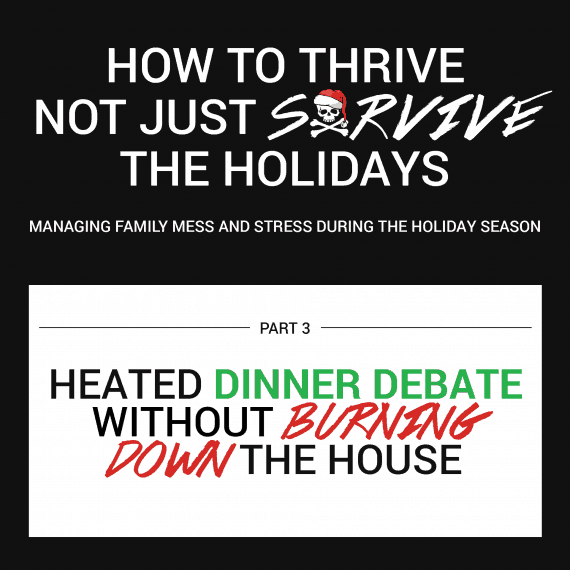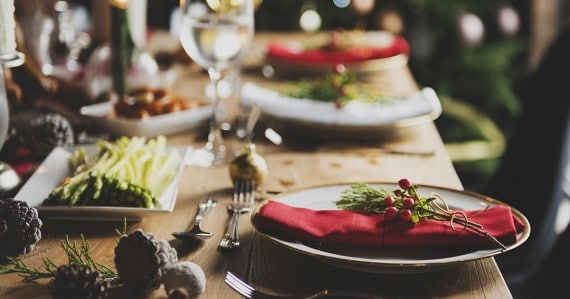If you find yourself in a tense debate with family members this holiday season, try this
(Note to reader: This is the third and final article of our 3-part holiday video series on How to Thrive, Not Just Survive, the Holidays: Managing Family Mess and Stress During the Holiday Season. To read Part One, click here. To read Part Two, click here.)
When you hear or read the words “family holiday dinner,” do you feel knots in your stomach?
Do you want to run for the hills? If so, you’re not alone, and chances are, some of your OWN family members may feel exactly the same way!
If you’ve ever gathered around the table with family during the holidays, it’s very likely that you’ve experienced some type of heated discussion.
The Power of Gratitude
Guided Meditation: Amplifying Abundance in all Areas of your Life
Family drama is a reality for many, and discussions during dinner – especially during the holidays – can quickly become emotionally charged and even upsetting.
But believe it or not, it’s actually possible to have a hot-button conversation without burning the house down.

According to Priya Parker, author of The Art of Gathering, in her TED talk:
“The next step of creating more meaningful everyday gatherings is to cause good controversy… The best gatherings learn to cultivate good controversy by creating the conditions for it, because human connection is as threatened by unhealthy peace as by unhealthy conflict…”
So how do you go about creating the conditions for good controversy – especially during a generally stressful time like the holidays?
Well, the following are 5 strategies to do just that.
Managing Holiday Stress and Creating Good Controversy At The Family Dinner Table

1. Embrace controversy by accepting differences.
Priya says that the larger and more diverse the group, the more likely it is for tension to rise.
Which is why it’s common for families with adult children, parents and grandparents with conflicting parenting styles (as we talked about in Part Two), family members with different political or religious beliefs, or in-laws with different holiday traditions to experience some tension around this time of year.
Although others may not share your opinions, my first piece of advice for you is to remember that everyone’s perspective is valid and worth taking into consideration. This applies even if the other person doesn’t share this belief.
If you don’t recognize, acknowledge and truly respect the concept of multiple perspectives, anything you say is going to appear condescending or insincere. The truth is that conflict often arises when people feel threatened that their views are under attack. Acknowledging that there are different opinions is a gesture of respect and inclusion that instantly diffuses conflict.
When you have an opinion about something, offer it as “something else to consider,” not as a preferred or better way of thinking about or doing something. And if this is not reciprocated, that’s okay. All you can do is to be responsible for your own actions.
2. Be yourself and allow others to be themselves.
Many people believe that to have a connection with someone else, you have to be the same. This attitude limits a relationship, because each person is unique: You AREN’T the same as anyone else and therefore, your opinions are going to differ as well!
That said, the best thing you can do during any gathering is to allow someone the space to be themselves, which requires that you suspend any judgements about them, their situation or their points of view.
A great way to practice this over the holidays is to invite others to share stories that no one at the table has ever heard before. You could even mention to the entire table that you’d like people to share stories instead of opinions in an effort to encourage everyone to share and listen more.
By allowing others to be themselves and by practicing being yourself, you will add a quality of freedom to your relationships that you may never have known was possible.

3. Seek to understand rather than trying to “win” the discussion or “be right.”
When you only seek to be “right,” the spirit of mutual understanding and cooperation is generally broken, and both family members begin to see each other as adversaries rather than teammates. In other words, when someone wins, that means someone also loses.
When this occurs, vulnerability is replaced with defensiveness, interrupting the flow of honest communication, and each person becomes more concerned with personal protection than reaching a mutually satisfying ending to the conversation.
The truth is that the interactions we have in many of our relationships – unlike debate rounds – aren’t transactional. In a debate, you argue for 45 minutes, you win or lose, and then you move on. With personal relationships, today’s interactions affect tomorrow’s and next month’s and next year’s if tensions are left to stew.
Not only does trying to “win” an argument generally fail to deepen the connection between two members of a family, but it generally increases the tension and puts an immediate damper on the holiday cheer. And no one wants that, right?
So, instead of aiming to win, I invite you to focus on understanding the other person’s point of view. Ask questions, listen carefully and always communicate with care and consideration. And even if the other person doesn’t repay the favor, you can walk away from the table knowing you did your part.

4. Accept the possibility of being wrong.
Conflict can actually be a good thing – but only when you’re willing to listen and have an open dialogue.
If you can go into a conflict indicating that you’re open to having your mind changed, you create the space for the other person to do the same. This tactic makes you more objective, less defensive and, as it turns out, more persuasive. You can even choose to see it as a process of discovery for you.
You can express your openness in many ways, whether through your tone of voice, emotional warmth, head nods or by asking questions respectfully and positively responding to the other person’s answers.

5. Practice gratitude.
Everyone who gathers at your table brings something unique to it. And so, instead of concentrating on your differences, how about appreciating what you’re grateful for?
Not only can you practice gratitude in private, but you can also encourage others to practice gratitude right before dinner by telling everyone that you’d like to try a simple, fun exercise. Turn to the person on your left and share something that you appreciate about this person.
Even if this person is a guest you’ve never met before, or if it’s a family member who irritates you, think of something you appreciate about what little you know or have seen of them so far.
For example: they may have a nice smile, a warm demeanor or seem very willing to help out with setting the table. They may even have great arguing skills!
Once you’re finished, that person then turns to the person on their left to share a gratitude, and then so on and so on.
Some of what is shared will be deep and profound, some of it may be more superficial and funny. It’s all perfect! The intention is to tune yourself to the frequency of gratitude and appreciation, speak that gratitude out loud and to remind everyone (including yourself) what the holidays are really all about.
Let’s review the 5 practices to have heated holiday discussions without burning the house down…
This year, rather than thinking about the holidays as a tense time when issues come to a head, try to think of them as a great time to connect with your family, have human conversations about the things you and your family care about, and enjoy everything the holidays have to offer (including the food!).
Here are 5 strategies for turning arguments into opportunities to connect this holiday season:
- Embrace controversy by accepting differences.
- Be yourself and allow others to be themselves.
- Seek to understand rather than trying to “win” the discussion or “be right.”
- Accept the possibility of being wrong.
- Practice gratitude.
By practicing the above five strategies around the holiday dinner table this year, you will have the chance to create good controversy, encourage more meaningful gatherings and deepen your existing relationships with family – all important skills to have if you want to grow as a person and enjoy this beautiful time of year!
This concludes my 3-part series on How to Thrive, Not Just Survive the Holidays. If you haven’t read the other two posts on “Overcoming Empty Nester Syndrome Without Turning Into a Grinch,” and “How to Gracefully Disagree With Adult Children’s Parenting Decisions ,” I encourage you to go back and check them out so you feel fully prepared for the holidays this year, no matter what’s in store.
Happy Holidays!
Would you love another valuable tool to help amplify your happiness this holiday season?
More and more people are becoming aware that the vibrational frequency of gratitude is harmonious with happiness and abundance.
When you feel truly grateful for what’s already in your life, you become a powerful beacon for everything that’s harmonious with your vision of a life you love living.
Practice gratitude this holiday season, and you’ll be surprised just how quickly more and more things you can be grateful for begin showing up in your life… including a healthy, loving family, more financial prosperity, career and business opportunities, positively-charged people and more!
And to help you shift yourself into a frequency of gratitude for the holidays, I have a free gift for you!
Download your FREE, 10-minute “Grateful: Happy, Healthy & Wealthy” guided audio meditation here.





Its 10 years now that my husband and I go far away on vacation for the holidays. It is only the two of us and we leave behind parents, relatives, brothers, sisters, kids, nieces and nephews. We NEVER spend the holiday with them and we have a peaceful Merry Christmas and Happy New year all by ourselves far far away!!!!
Great thoughts.
Thank you so much for these words of wisdom! We will be having 5 generations here for the holidays. Since I am in the middle, I can benefit from all of this advice!
Thank you & Merry Christmas!!